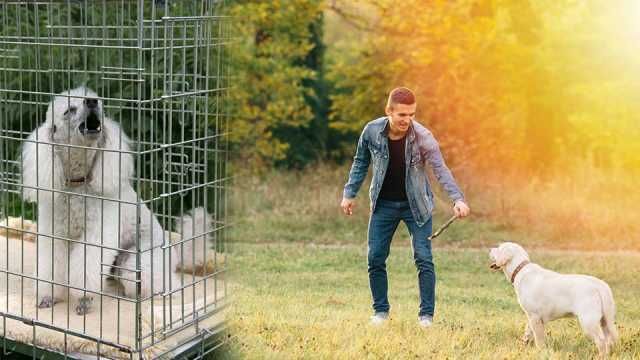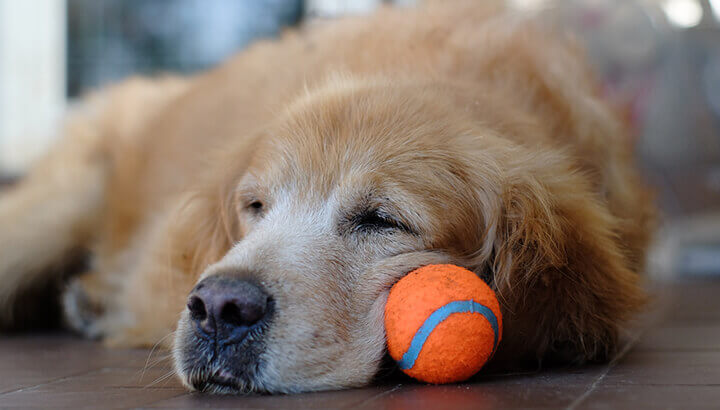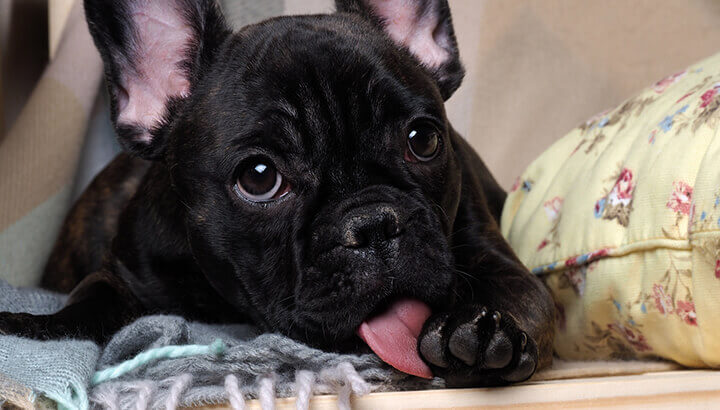
Nothing can compare to the pure, simple love we have for our pets. And on the pet-love spectrum, dogs come up trumps. They’re loyal, intelligent, conscious of their owners’ emotions and a whole lot of fun. In short, they really are man’s best friend, and as such you want the best for them.
The problem is, they keep licking themselves. Not the occasional, therapeutic lick of a dog cleaning a patch of fur or ferreting out an annoying seed or thorn, but constant, incessant licking. It’s gotten to the point where they’re starting to remove their own fur with all that licking, and nothing you do can seem to convince them that it’s really not a great idea.
This kind of behavior can actually become quite dangerous to the health of your dog. Aside from chronic hair loss, which is a big enough problem in itself, this incessant licking can set your dog up for something called acral lick dermatitis, otherwise known as lick granulomas. These are infections on the surface of the skin that can be very difficult to heal and extremely painful to your (somewhat) furry little guy.
So how can you stop your prized pooch from becoming a hairless hound?
Anxiety: the source of most chronic licking in dogs
If your dog has a serious self-licking problem, there’s a very good chance that they’re suffering from anxiety issues. Interestingly, while obsessive compulsive disorder in humans can result in an infinite number of different repetitive habits, dogs suffering from conditions like aural lick dermatitis only ever manifest a compulsive behavior in one way: obsessive licking.
Research that has looked into obsessive licking in dogs continues to conclude that these types of behaviors are almost always as a result of an anxious or nervous behavioral problem. If your dog is stressed out about something, they invariably turn to licking themselves as a way of soothing their troubled disposition. The more stressed or anxious they get, the more they’ll lick themselves… and the more hair they’ll lose.
There are, of course, exceptions to this rule. Our border collie, for example, recently licked a specific area of her chest raw. We were worried that she was suffering from a behavioral issue, but the hairless region she’d created revealed something else: an infection under the skin, that was causing inflammation and (clearly) pain. Licking at the area was her way to try and clean the wound and stop the spread of the infection.
Aside from these anomalies, however, if your dog is showing signs of obsessive licking, your first action should be to try and ascertain what it is that’s causing the anxiety.
What’s making your dog so anxious?
Lack of exercise

Most of the time, dog anxiety is usually due to something as simple as a lack of exercise. As you’ll no doubt have noticed, most healthy dogs have far more energy than we do — during a walk, they’ll typically run three to four times farther than the distance you yourself walk, racing back and forth chasing squirrels, fetching sticks, swimming and generally just having the time of their lives.
You’ll also notice something else during these walks: they’re usually at their happiest when they’re bounding along and expending energy. The opposite is true of a dog that’s shut indoors. In these scenarios, they have a huge surplus of energy that has no outlet, and the result is a growing anxiety that can often manifest in obsessive licking.
With this in mind, resolving your dog’s licking issue might be as simple as taking them out for a long walk. After they’re good and puffed, take them home and observe how they behave. Do they abandon their attempts to remove all their fur, at least temporarily? If yes, chances are you simply need to increase their daily exercise.
And it’s no chore — dog walking is an excellent reason to get out into nature and to exercise yourself, which as we know is a critical part of being a healthy human! Like your dog, getting exercise releases mood-elevating endorphins and lowers stress levels, allowing you to relax easier and sleep better. It’s a win-win, really.
Separation issues
Another reason for your dog’s obsessive behavior could be separation anxiety. If you spend too much time with your beloved pooch, they can become overly attached to you… to the point where they become stressed when you leave the room. Imagine how anxious it would make them when you leave the house for hours at a time!
Their response might be to lick themselves as a soothing activity. To resolve this behavioral issue, then, you need to gradually but firmly allow your dog to spend time away from you, preferably by themselves or with other dogs. Giving them a little less attention, no longer allowing them to sit with you on the couch or sleep in your bed, will allow them to relax more over time and realize that there’s a life even when their owner temporarily leaves them.
Here are some other causes of obsessive licking and ways to stop your dog from licking their hair off:
Allergies

Dogs that suffer from allergic reactions to something often develop itchy or inflamed skin, which causes them to lick the area in question. Sources of these allergies could be anything — food intolerances, washing chemicals you used to clean their bed, cigarette smoke, flower pollen… the list goes on.
Unless you see a very obvious correlation between a potential allergen (say you changed their food and they began licking themselves that same day) and your dog’s obsessive licking, your best bet is to get them tested. Most vets will generally offer either a blood allergy test or an intradermal skin test — both are an effective way to rat out the allergens, and in short order you can isolate the allergen and remove it from your dog’s life. Hopefully it isn’t your favorite perfume or cologne!
Fleas
Ah, fleas. A dog’s worst nightmare. As you well know, fleas can be extremely irritating to your dog, causing them chronic itching and possibly resulting in them licking themselves in an attempt to soothe the itch and remove the fleas.
Usually, an easy way to determine whether the source of the licking is fleas or something else is to watch your dog and see whether they’re also scratching the area or biting at the same patch over and over. Most dogs with fleas wouldn’t just lick — they’d do everything in their power to locate the itchy little blighters and get rid of them! If it looks like your dog has fleas, consider using a natural, non-toxic flea remover.
— Liivi Hess

